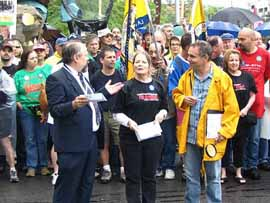Canadians Campaign to Stop Postal Closure and Service Cuts

Canada Post’s CEO,Moya Greene, took office last year with the announcement that she wanted a “no surprises” relationship with the Canadian Union of Postal Workers (CUPW). Greene’s first major public decision was to close the mail sorting plant in Québec City, eliminating hundreds of jobs. CUPW’s 54,000 members and the local community weren’t surprised—they were shocked.
It didn’t take long for the union to shrug off that shock and organize an offensive of its own: Operation Transparency, a militant mobilization aimed at preventing the closure. The union gave Canada Post a 60-day window to publicly disclose plans for the public postal service or face the possibility of nonviolent civil disobedience.
TRANSPARENCY
“What does Canada Post have to hide?” asked CUPW President Deborah Bourque. “Why won’t it release its plans? Mail users, the public, the media, we all have a right to know. If we must be arrested to gain more transparency from Canada Post, then we’ll be arrested. Transparency is a cornerstone of democracy.”
Seventeen CUPW leaders and supporters were arrested June 19 as they tried to enter Canada Post headquarters as part of the campaign’s opening moves.
“Operation Transparency is about whose vision of the future of the public postal system is shared by the public,” said Bourque. “Ours, which sees an expanded service responsible to the communities in which they operate without using taxpayer dollars; or theirs, which sees profits only?”
Despite $199 million Cdn in profits, Greene said that Canada Post is “withering” and that “$200 million Cdn on a $6.7 billion Cdn revenue base, where I come from, would be totally unacceptable.” Ironically, Greene came from a private sector company, with a larger revenue base, that lost money.
CALCULATED ATTACKS
Canada Post’s attacks on public service have grown more brazen, its attacks on members and the union more calculated. At the same time members were fighting the Québec City closure, the corporation tried to cash in on rural workers’ right to refuse unsafe work.
Rural and suburban mail carriers were concerned about increasingly dangerous road conditions and repetitive stress injuries caused by reaching out passenger windows to put mail in rural mailboxes. Many used their right to refuse unsafe work under the Canada Labor Code.

SUPPORT LABOR NOTES
BECOME A MONTHLY DONOR
Give $10 a month or more and get our "Fight the Boss, Build the Union" T-shirt.
Instead of working with the union to fix unsafe conditions and maintain service, the corporation set up “community mailboxes” that make people travel up to 60 miles to collect their mail.
It takes extremely dangerous conditions for rural workers to stop servicing the communities they belong to and care for. “They cut runs and shifted the blame by telling everyone that it was because we refused to do the work,” said Heather Manual, vice-president of her Fredericton, New Brunswick local. “I grew up where I deliver. I want the work. But I want to do it safely.”
Manual is part of a community fightback campaign that includes well-organized CUPW members, angry residents, frustrated politicians, and flummoxed journalists. Together they’re making the corporation tap-dance backwards and return service safely to the community through a joint health and safety committee.
“Whether it’s the Québec City closure or rural route services around Fredericton, we won’t die the death of a thousand cuts,” said Bourque.
“To stop this sort of bullying we need to be tough and we need to be smart. We have to deal with the limited and limiting mainstream communications media, but our real strength in the workplace, in the street, in the courts, and in the political arena is our grassroots activism and member-to-member communication.”
Over 130,000 people have signed petitions and many union members have demonstrated. Over 800 municipalities, countless public figures, sister unions, allies, and members of Parliament have made their position known to Canada Post.
They’ve said with one voice: cancel the closure of the Québec City sorting plant and proposed closures elsewhere; consult us before you make any change to our postal network; expand the public postal service.
With a lobbying hammer from above and an activist anvil below, CUPW hopes to crush the culture of secrecy at Canada Post. “It’s our public postal service,” said Bourque. “We made it, we like it, we want it, we’ll keep it.”





